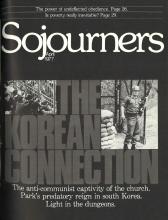A christian community that coheres in Jesus Christ, and in connection with the pentecostal powers released by Jesus, is in itself the ultimate revolutionary political act. To be in a faith community is the ultimate claim on every life which is grasped by Jesus Christ. There are many calls and a great variety of gifts, but one clear, inescapable, central commitment: to be a new people, a community undergoing interior transformation and witnessing to the ultimate power of the kingdom.
One doesn’t come into the faith community to get into the order of the world and do battle there. One becomes a part of the new reality, that revolutionary force, the new power. The fact that this new society exists is a witness that the powers of death are doomed. The revolutionary faith community is a context in which one undergoes interior transformation--the inner revolution in which one is freed from the dominating, victimizing powers, and thereby becomes a humanizing revolutionary force in whatever institution one serves.
Now what’s the main task of the faith community, if the central claim of Jesus Christ upon a person is to become a part of a faith community? The task of the faith community is to witness to the ultimate power in the universe, which is the power released by Jesus Christ at Pentecost--the power of weakness, the power of love--dunamis. And the reverse side of this task is to debunk every other power-the powers of darkness and death-the principalities and powers.
The biblical understanding is that there is a desperate struggle going on between the power of the kingdom and the powers of darkness and death. The power of God versus anti-God. The power of Christ versus the power of antichrist. The power of Christ liberates and brings a whole created order to fuller freedom. Antichrist restricts, oppresses, victimizes and ultimately destroys.
Read the Full Article

